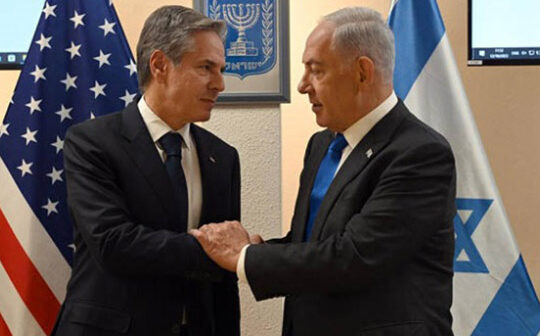
Re-published with permission from BESA.
Hamas has conducted the most devastating terror attack in Israel’s history, demonstrating humanity’s worst depravity. The attack led to the tragic loss of over 1,200 lives, including at least 22 Americans, with many more individuals held hostage. The US has a responsibility to its citizens to demand the extradition of Hamas leadership to face trial in the US. Drawing upon precedent and previous successful extraditions of international terrorists, the US can leverage diplomatic relationships and military assets to actively pursue their extradition from Qatar, Lebanon, or other locations where they may reside.
Extradition is the official process by which one country formally requests the surrender of an individual to face criminal charges or serve a sentence for crimes committed in the requesting country or upon the requesting country’s citizens. Bilateral or multilateral treaties often govern this procedure but it can also be based on reciprocity or other agreements between the countries involved.
Israel commemorated Simchat Torah this week, a holiday that traditionally celebrates the completion and renewal of the Torah reading cycle with vibrant singing and dancing. This year’s festivities were brutally interrupted by what is already being referred to as Israel’s own 9/11, its second Yom Kippur War, and its Pearl Harbor. In a shocking act of terror, Hamas launched an unprecedented attack, claiming the lives of at least 1,200 innocents and abducting over 100 more, including women, children, and the elderly.
This heinous act exhibited humanity’s most depraved behavior: murder, rape, kidnapping, torture, among many other unconscionable brutalities. Among the victims were at least 22 Americans, and it has been reported that several US citizens remain among the hostages.
Hamas and its atrocities will face retaliation by Israel. Concurrently, the US bears a duty to ensure justice for its citizens. A necessary step in pursuing justice would be to demand the extradition of Hamas’s top leadership, currently shielded in Qatar and Lebanon, to face trial in the US.
The leadership of Hamas resides abroad, not in Gaza. The man responsible for the worst attack in Israel’s history is Ismail Haniyeh, Hamas’s leader and Chairman of the Hamas Political Bureau (Politburo). He resides in Qatar, in safety and opulence. He has been the chief of Hamas since 2017 and controls the group’s political activities in Gaza. Yahya Sinwar is Hamas’s leader inside Gaza and also a Politburo member. He was in overall command of the attack. Since 2015, he has been a Specially Designated Global Terrorist (SDGT) by the US State Department. His location is unknown, but he is rumored to have left Gaza shortly before the attack. Izzat Al-Risheq is also a member of the Hamas leadership’s inner circle. He is a founding member of the organization and is currently heading its media department. He resides in Qatar. Saleh al-Arouri, Haniyeh’s deputy, is believed to reside in Lebanon. He is the founding commander of the Izz ad-Din al-Qassam Brigades, which were originally created to sabotage the Oslo Accords. The current commander of the al-Qassam Brigades is Mohammed Deif, who is believed to be the operational planner of the attack. His current location is unknown. This is not a complete list. There are 15 members in total in the Politburo and tens of operational commanders.
Precedents have been set. The US has been successful with extraditions of wanted terrorists in the past. In a case legally similar but on a much smaller scale, two ISIS terrorists known as “The Beatles” were extradited to the US and stood trial for the torture and deaths of four Americans who were kidnapped in Syria. The two ISIS militants were captured by Kurdish forces in 2018 and turned over to the US Marshals Service. Abu Hamza al-Masri, an Egyptian cleric, was extradited from the UK to the United States to face terrorism charges. He was found guilty of eleven terrorism charges by a jury in Manhattan and sentenced to life in prison without the possibility of parole.
There are also cases of the US being denied an extradition request and yet being able to circumvent the problem. Monzer al Kassar, an international arms trafficker, was extradited to the Southern District of New York from Spain to stand trial on terrorism charges. He was accused of providing material support to al-Qaeda and other terrorist groups. He was tricked into traveling to Madrid by a successful DEA operation, arrested, and extradited. After the 1993 World Trade Center bombing, the primary suspect, Ramzi Yousef, fled to Pakistan. The US sought his extradition. Islamabad eventually cooperated; however, with the lack of a formal extradition treaty and potential legal obstacles, Yousef was captured in a combined operation of Pakistan’s Inter-Services Intelligence (ISI) and US Diplomatic Security Service. He was then removed to the US for trial without a formal extradition process.
Easily the most remembered example of the US demanding extradition from a country lacking an extradition treaty was after the 9/11 attacks. President Bush ordered that al-Qaeda members be turned over to the US. Bush demanded “turn [bin Laden]over, turn his cohorts over, turn any hostages they hold over.” By “aiding and abetting murder,” the president said, “the Taliban regime is committing murder.” The US demands were “not open to negotiation or discussion.” Of course, the Taliban refused, and the US invaded Afghanistan. Bush said, “The civilized world is rallying to America’s side. They understand that if terror goes unpunished, their own cities, their own citizens might be next.” It is hard to read Bush’s sentiment from 2001 and not apply it to what is currently happening in Israel.
The United States designated Hamas as a terrorist organization in 1995. If extradited, US federal charges against Hamas leaders could include Conspiracy to Murder Americans Overseas. This charge was brought against Ibrahim Suleiman Adnan Adam Harun, who was sentenced to life in prison for conspiring to murder American military personnel in Afghanistan. Also possible is Conspiracy to Provide Material Support to Terrorists. Zubair Ahmed and Khaleel Ahmed pleaded guilty to this charge concerning their efforts to travel abroad to murder or maim US military forces in Iraq or Afghanistan. After the bombings of the US Embassies in Kenya and Tanzania, Osama Bin Laden and approximately 20 alleged al-Qaeda loyalists were indicted in absentia for conspiring to murder Americans worldwide.
The US does not have extradition agreements with Qatar or Lebanon, but it has leverage. In requesting extradition from Qatar, Washington has some influence over Doha. Initially, Doha will almost certainly not accept. However, the US can orchestrate the desired outcome with a well-constructed “carrot and stick” approach. The US has a significant military presence in Qatar, including the Al Udeid Air Base, a crucial regional strategic asset. The future of this base and broader military cooperation, such as access to military sales, could be used as a bargaining chip. Economic levers could offer incentives like future trade deals or impose targeted sanctions against individuals or entities. Also, the US can endeavor to work with other allies, like Saudi Arabia and Turkey, to influence Qatar.
Lebanon presents a different set of challenges for the US regarding exerting influence. The country’s complex sectarian and political landscape and ongoing economic and political crises all play a role. However, there are still various tools the US could consider. Given Lebanon’s dire economic situation, the US could use economic assistance as a bargaining tool. Also, Washington can impose targeted sanctions on Lebanese individuals or entities that are obstructing the extradition request or are involved in supporting terrorism.
However, in the end, Saleh al-Arouri is almost certainly in areas controlled by Hezbollah, and the only realistic way to get to him is with a USSOCOM lead operation (i.e., special forces operation). US Army Delta Force conducted an operation like this to capture Abu Anas al-Libi in Tripoli, whom a federal court in New York indicted for his involvement in the 1998 US embassy bombings in Tanzania and Kenya. Delta Force operators captured al-Libi and held him on a US Navy ship until he could be delivered to NY for trial.
The United States has a long-standing tradition of holding those responsible for the deaths of its citizens accountable, regardless of where they hide or the complexities involved in their capture. The abhorrent acts of terror against innocent civilians in Israel, including Americans, necessitate a firm, unequivocal response. With established legal precedents and a proven history of both diplomatic and military actions tailored to secure the extradition or capture of terrorists, the US can act decisively.
While the primary conflict is between Israel and Hamas, Hamas leadership, safe in their foreign sanctuaries, will escape justice. America’s duty to its citizens, commitment to justice, and global stance against terrorism demand that senior Hamas leadership be brought to American soil to face the full weight of US law.
Image: Haim Zach, GPO.






